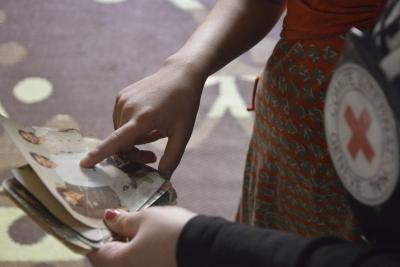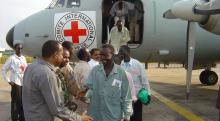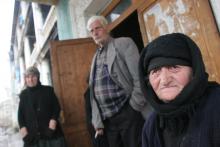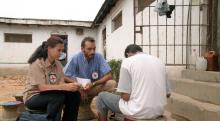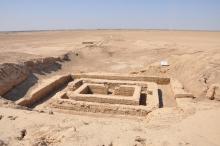Basic international humanitarian law (IHL) rules applicable to this situation:
Whenever possible, each party to the conflict must, without delay, take all possible measures to search for, collect and evacuate the dead without adverse distinction.
Parties to the conflict must endeavour to facilitate the return of the remains of the deceased upon request of the party to which they belong or upon the request of their next of kin.
The dead must be disposed of in a respectful manner and their graves respected and properly maintained.
To facilitate identification of the dead, each party to the conflict must record all available information prior to disposal and mark the location of the graves.
Each party to the conflict must take all feasible measures to account for persons reported missing and must provide their family members with any information it has on their fate.
The case in brief
Following the 1990–1991 Gulf War, a Tripartite Commission was established under ICRC auspices comprising representatives of Iraq, Kuwait and the 1990–1991 Coalition (United States of America, United Kingdom, France, Saudi Arabia). The Commission, chaired by the ICRC, is mandated to ascertain what happened to people missing in connection with the conflict.
Recognizing the importance of providing families with information about their missing relatives, the Commission members drew on forensic expertise and advanced technology to search for and recover human remains. Owing to their joint efforts, numerous sets of human remains were located and repatriated.
IHL compliance highlights
- The Commission worked proactively to clarify the whereabouts of the missing. For example:
- Coalition members provided information to help identify grave sites in Iraq and Kuwait.
- Iraq organized regular field missions to explore and excavate sites of interest.
- An ICRC-led review in 2017, involving external experts, gave recommendations for future work aimed at accelerating progress.
- In 2011, following the discovery and identification of remains of 32 Iraqi soldiers in Kuwait, the Kuwaiti authorities arranged for their repatriation to Iraq.
- Following the discovery and recovery of human remains in Iraq in March 2019, the Iraqi and Kuwaiti governments cooperated to transfer the remains to Kuwait for forensic examination. The Kuwaiti authorities confirmed that the remains, once identified, would be returned to the victim’s family.
Case prepared by Federica Olimpieri and Jasmine Nicolson, LL.M. students at Leiden University, under the supervision of Professor Robert Heinsch as well as Sofia Poulopoulou (PhD researcher), Johanna Trittenbach and Mahan Charmshir (research assistants), Kalshoven-Gieskes Forum, Leiden University.
A. KUWAIT HANDS OVER THE REMAINS OF IRAQI SOLDIERS
[Source: ICRC, ‘Kuwait: remains of 32 Iraqi soldiers repatriated’, 04 July 2011, available at https://www.icrc.org/en/doc/resources/documents/news-release/2011/kuweit-news-2011-07-04.htm]
[…]
The remains were exhumed from a burial site on Kuwaiti soil near Abdaly by forensic technicians led by specialists from the Kuwait Crime Evidence Department. Officials representing Iraq's Ministry of Human Rights, Kuwait's National Committee for the Missing and Prisoner of War Affairs, and the embassies of the United States and the United Kingdom in Kuwait witnessed the exhumation, as did delegates of the ICRC.
"This operation demonstrates the commitment of the parties concerned to do everything in their power to determine what happened to the people still unaccounted for, and to share the information obtained with the families," said Mr. Peytrignet.
The members of the Tripartite Commission, set up in 1991 under ICRC auspices and composed of representatives of Iraq, Kuwait and the 1990-1991 Coalition (the United States, the United Kingdom, France and Saudi Arabia) have committed themselves to reinforcing joint search and recovery activities for people who went missing in connection with the 1990-1991 war.
The Kuwaiti and Iraqi authorities cooperated fully in the repatriation operation. In its role as a neutral intermediary, the ICRC placed delegates on both sides of the border to ensure that the handover proceeded smoothly.
Under international humanitarian law, the families have a right to know what happened to their missing relatives. The parties to the conflict must search for persons reported missing and provide information for the families.
B. IRAQ DISCOVERS KUWAITI REMAINS FROM 1990-91 GULF WAR
[Source: Kuwait News Agency (KUNA), ‘Iraq to hand over samples of human remains to Kuwait – MoD’, 1 July 2019, available at https://www.kuna.net.kw/ArticleDetails.aspx?id=2805528&language=en]
BAGHDAD, July 1-- Iraqi Defense Ministry said Monday it would hand over to Kuwaiti authorities samples of human remains that were recently found in southern Iraq and might belong to missing Kuwaiti citizens.
The remains were found in two locations near Nuqrat Al-Salman area in southern AlMuthanna Governorate, the ministry said in a statement.
Cooperation between Iraq, Kuwait and the International Committee of Red Cross (ICRC) contributed to discovery of the remains, it added.
The ministry said the remains were exhumed and sent to laboratory in Baghdad to examine if they match DNA samples of families of missing Kuwaitis.
Iraq, it added, would hand over samples of all remains for further DNA tests.
On June 20, a joint statement by ICRC-affiliated Tripartite Commission announced recovery of the remains, offering hope for families of missing people from 1990-91 Gulf War. Kuwait and Iraq are the other Commission members.
Kuwait Deputy Prime Minister and Foreign Minister Sheikh Sabah Khaled Al-hamad AlSabah had welcomed ICRC's endeavors which contributed to finding the remains "which we hope belong to Kuwaiti citizens." Kuwait, he added, was awaiting "important positive developments" that would achieve concrete progress on the ground in order to end over 28 years of suffering of families of the missing.
Sheikh Sabah Al-Khaled, who said Kuwait would spare no efforts to know fate of missing citizens to close this humanitarian file, commended "genuine desire" of Iraq to fulfill UN related obligations towards Kuwait.
C. IRAQ IDENTIFIES THE REMAINS OF KUWAITIS
[Source: The Baghdad Post, ‘Iraq identifies remains of 32 Kuwaitis found in mass grave’, 4 August 2019, available at https://www.thebaghdadpost.com/en/Story/43279/Iraq-identifies-remains-of-32-Kuwaitis-found-in-mass-grave]
The [Iraq's Foreign] ministry spokesperson, Ahmad al-Sahaf, said in a statement that the “Iraqi technical team tasked with the file of the missing Kuwaitis and prisoners was able, in cooperation with the Red Cross, to locate the mass grave in the province of Muthanna on March 6.” The grave contained 46 human corpses, he said, adding that preliminary DNA examinations revealed that 32 of them belonged to Kuwaitis who had been missing.
The ministry spokesperson also said in the statement that Iraq would cooperate with Kuwaiti authorities to transfer the remains to Kuwait and provide proper support for forthcoming tasks in the case. Sahaf affirmed that Iraq is seeking with utter concern to end ramifications of this humanitarian tragedy that involved Kuwaiti brothers in the beginning of the “invasion of their country in 1990 and determine the destiny of the missing and Kuwaiti prisoners.”
[...] Iraq will spare no effort in determining the fate of the other missing Kuwaitis and “what has been discovered recently depicts the continuation of the efforts that has led to information about the remains,” he said.
But Kuwaiti Assistant Foreign Minister for International Organizations Nasser Al-Hayyen said later on Friday that more examinations are required to determine the identity of the 32 bodies. […] He pointed out that Kuwait has presented an official request to Iraq to receive the recovered bodies to carry out its own tests and compare the results with its DNA database of Kuwaiti POWs and missing people.
Recognizing the identities of the recovered bodies is the sole responsibility of Kuwait’s General Department of Criminal Evidence, which has the complete DNA database related to POWs and missing people, he clarified. He affirmed that once the identity of any body is known, their family would be notified.
D. ICRC STATEMENT ON THE PROGRESS OF THE TRIPARTITE COMMISSION
[Source: ICRC, ‘Statement to United Nations Security Council Briefing on UN Assistance Mission for Iraq (UNAMI)’, 3 December 2019, available at
https://www.icrc.org/en/document/work-missing-requires-determination-we-must-keep-course-no-matter-commitment#gs.kc7s39]
[...]
The International Committee of the Red Cross has chaired the Tripartite Commission since its founding in 1991. Following the end of the Gulf War. Iraq, Kuwait and Coalition members – Saudi Arabia, France, the United Kingdom and the United States – created the Commission to search for missing persons. Today the Commission and its Technical Sub-Committee, with UNAMI serving as observer and the ICRC as chair, aim to trace persons still unaccounted for and provide answers to families.
Just over a year ago, the ICRC provided this Council an update on the workings of the Tripartite Commission and the Technical Sub-Committee. We reported that since the founding of the Tripartite Commission we had helped repatriate more than 75,000 citizens, civilian internees and prisoners of war. After 2003, once the search for burial sites began in Iraq and later in Kuwait, the remains of 275 persons in Iraq and 98 persons in Kuwait have been recovered. To date, a total of 1,080 cases of missing persons remain open within the frame of the mechanism. Of these 1,080 cases, 371 were reported missing by Kuwait, 700 by Iraq and 9 by Saudi Arabia.
Today, I am pleased to confirm that for the first time in 14 years Kuwaiti remains were recovered. These remains were recovered in Al-Muthanna, Iraq in March 2019. Since 2003, the members of the Mechanism with the support of the ICRC have been conducting excavations in both Iraq and Kuwait. Prior to this year the last successful exhumation of human remains was in 2011. Those were Iraqi remains found in Kuwait. No remains or burial sites were found for eight years – and it's been 14 years since the last recovery of Kuwaiti remains.
[…] Early this year we had a breakthrough with new information leading to identification of two mass graves of alleged Kuwaiti citizens. This breakthrough came about in part due to the recommendations and findings from the ICRC's "Review Project" completed in July 2017. The project took stock of the situation, involved experts and forensic specialists, and proposed recommendations for future work. The Review Project Report and its recommendations were adopted by the Tripartite Commission in December 2018 and have been used since to guide desk- and field-based work deployed to make progress in the search and recovery of further remains of missing persons.
Witness information, analysis of satellite imagery and several previous exploration missions led us to Samawa in Al-Muthanna Governorate. It is where the breakthrough happened, and human remains were exhumed in March 2019. In August, the Iraqi authorities handed over 46 boxes and 2 bags containing those remains, which are currently being processed by the Kuwaiti authorities at their national forensic laboratories. This is a time-consuming process that is expected to last into next year. If a match is found, the remains will be reunited and returned to their families.
[...]
There is a lesson here in this breakthrough. The wounds of the missing are long-lasting and deep. When persons go missing their absence affects the family, the community, and the society as a whole. To solve these cases takes time, patience and cooperation between governments, humanitarian organizations and the families of the missing. But most importantly the work on the missing requires perseverance and determination. […]
Field missions are being organized by Iraq regularly to explore and excavate sites of interest. Other members of the mechanism, namely, the United Kingdom, France and the United States, have made significant efforts to provide relevant information in the hope that further research will help identify more grave sites in Iraq and Kuwait.
[…]
Discussion
I. Classification of the Situation and Applicable Law
1. How would you classify the situation in the Persian Gulf in 1990-91? Was there an armed conflict? If so, were Iraq and Kuwait parties to the conflict? Which rules of IHL applied to the situation? (GC I-IV, Art. 2; Hague Regulations, Art. 42)
II. Clarifying the Fate of Missing Persons and accounting for the dead
2. Who is a missing person under IHL? (PI, Art. 33)
3. What are the obligations of the parties to the conflict with respect to missing persons and their next-of-kin?
a. Are the parties to the conflict required to take steps with the purpose of preventing the persons going missing in armed conflicts? If yes, what are these duties? (GC I, Arts 16, 17; GC II, Art. 19; GC III, Art. 70, 71, 122, 123, 126; GC IV, Arts 25, 106, 107, 136; CIHL, Rule 117, 125, 126)
b. When persons are reported missing what steps should parties to the conflict take to clarify the fate of such persons? What does IHL say about ‘the right to know’? (P I, Art. 33)
4. What are the obligations of the parties to the conflict in relation to the dead? How do these obligations relate to the duty to clarify the fate of missing persons? Does the end of the conflict dissolve the belligerents of their obligations towards the dead? (GC I, Arts 15, 16, 17; GC III, Art. 120; GC IV, Arts 16, 129, 130, 131; PI, Art. 34; PII, Art. 8; CIHL, Rules 112, 113, 114, 115, 116)
III. Elements Contributing to Respect for IHL
5. (Documents A and C) Does the existence of a Tripartite Commission play a role in clarifying the fate of missing persons? What is the significance, if any, of the ICRC chairing the Commission? How did cooperation among the members of the Tripartite Commission contribute to the efforts to ascertain the fate of missing persons?
6. (Documents A, B, C, D) According to the Iraqi spokesperson’s statement, “Iraq is seeking with utter concern to end ramifications of this humanitarian tragedy that involved Kuwaiti brothers […].” Do you think that the recovery and repatriation the bodies of the deceased give a closure and a sense of justice to families and help the society to recover? Could the will to reconcile and establish peace influence the respect for IHL?
7. (Documents A, B, C, D) In your opinion, can the search for missing persons improve the diplomatic relations between Iraq and Kuwait? Conversely, how will the improvement in political and diplomatic relations facilitate the search for the missing and the recovery of the bodies of the dead? Is the obligation based on the concept of reciprocity?
8. (Document D) Could the 2017 Review Project and the use of advanced technical means by the parties, in their efforts to search for, recover and identify the human remains of the deceased, have helped the parties to the conflict to fulfill their duties under IHL?

